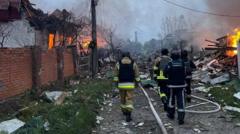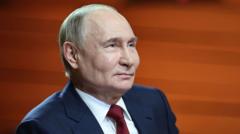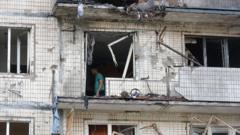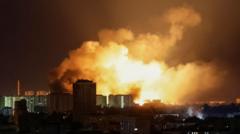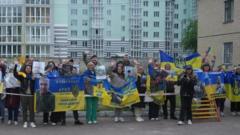The possibility of presidential elections in Ukraine this summer is generating buzz amid speculation surrounding President Zelensky's potential bid for reelection. Despite calls for unity against Russian aggression, political discussions are rekindling in Kyiv, reflecting the complex interplay of war, public sentiment, and legitimacy.
Uncertain Future: Speculations on Ukraine's Elections Amid Ongoing Conflict
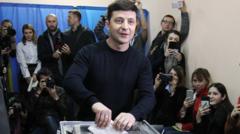
Uncertain Future: Speculations on Ukraine's Elections Amid Ongoing Conflict
As discussions about a potential presidential election in Ukraine intensify, the nation grapples with peace talks and the challenges of martial law during the ongoing war against Russia.
Article:
As air raid sirens echo through Ukrainian cities amidst constant Russian bombardment, post-war elections might appear to be a distant dream. Yet, whispers of a possible electoral shift are circulating in Kyiv, sparking renewed discussions about democracy amidst turmoil.
In a country grappling with a relentless war, every hint of elections has met with skepticism. The last presidential election was held in 2019, and since the onset of the full-scale invasion, the need for unified resistance against the invader has dominated the national agenda. Subsequently, the presidential election scheduled for 2024 was postponed in accordance with Ukraine's martial law enacted in the wake of the invasion.
Despite this, the Kremlin has capitalized on the situation, doubting the legitimacy of President Volodymyr Zelensky's leadership and suggesting that elections should occur as a precursor to any ceasefire negotiation—a narrative echoed by former President Trump.
Rumors are intensifying about a potential re-evaluation of the electoral timeline as ceasefire dialogues advance. Reports from credible sources indicate that Zelensky might be contemplating an election sooner than anticipated, potentially as early as this summer. This speculation gained traction especially with the growing support for Zelensky, which has reportedly risen since recent confrontations with U.S. political figures.
Valerii Zaluzhnyi, a likely candidate and former military commander, rapidly dismissed rumors regarding his political ambitions, firmly stating that the war's priority requires concentrating efforts on national preservation rather than electoral pursuits. His public denial underlines the weight of the ongoing crisis.
While Oleh Didenko, head of the Central Election Commission, acknowledges that personnel and legislation must adapt to conditions during the war for elections to take place, there is growing belief that Zelensky needs a strategic win before political schisms emerge post-war. The possibility of martial law expiry by early May could serve as a pivotal moment for announcing elections.
U.S. officials are reportedly anticipating elections, which could apply political pressure on Zelensky. However, hurdles such as displacement from the war, the effectiveness of technological voting through digital platforms, and the trustworthiness of Diia—the digital application intended for streamlining voting—remain contentious.
Despite these logistical discussions, many Ukrainians are against the idea of elections, feeling that current priorities lie with war efforts rather than political maneuvering. Polls indicate that a significant majority oppose elections until a full resolution of the conflict.
As the situation remains dynamic, the balance between the urgent need for political processes and the pressing realities of war continues to shape the dialogue in Ukraine's capital, leaving the nation's future as uncertain as ever amidst the echoes of warfare.
As air raid sirens echo through Ukrainian cities amidst constant Russian bombardment, post-war elections might appear to be a distant dream. Yet, whispers of a possible electoral shift are circulating in Kyiv, sparking renewed discussions about democracy amidst turmoil.
In a country grappling with a relentless war, every hint of elections has met with skepticism. The last presidential election was held in 2019, and since the onset of the full-scale invasion, the need for unified resistance against the invader has dominated the national agenda. Subsequently, the presidential election scheduled for 2024 was postponed in accordance with Ukraine's martial law enacted in the wake of the invasion.
Despite this, the Kremlin has capitalized on the situation, doubting the legitimacy of President Volodymyr Zelensky's leadership and suggesting that elections should occur as a precursor to any ceasefire negotiation—a narrative echoed by former President Trump.
Rumors are intensifying about a potential re-evaluation of the electoral timeline as ceasefire dialogues advance. Reports from credible sources indicate that Zelensky might be contemplating an election sooner than anticipated, potentially as early as this summer. This speculation gained traction especially with the growing support for Zelensky, which has reportedly risen since recent confrontations with U.S. political figures.
Valerii Zaluzhnyi, a likely candidate and former military commander, rapidly dismissed rumors regarding his political ambitions, firmly stating that the war's priority requires concentrating efforts on national preservation rather than electoral pursuits. His public denial underlines the weight of the ongoing crisis.
While Oleh Didenko, head of the Central Election Commission, acknowledges that personnel and legislation must adapt to conditions during the war for elections to take place, there is growing belief that Zelensky needs a strategic win before political schisms emerge post-war. The possibility of martial law expiry by early May could serve as a pivotal moment for announcing elections.
U.S. officials are reportedly anticipating elections, which could apply political pressure on Zelensky. However, hurdles such as displacement from the war, the effectiveness of technological voting through digital platforms, and the trustworthiness of Diia—the digital application intended for streamlining voting—remain contentious.
Despite these logistical discussions, many Ukrainians are against the idea of elections, feeling that current priorities lie with war efforts rather than political maneuvering. Polls indicate that a significant majority oppose elections until a full resolution of the conflict.
As the situation remains dynamic, the balance between the urgent need for political processes and the pressing realities of war continues to shape the dialogue in Ukraine's capital, leaving the nation's future as uncertain as ever amidst the echoes of warfare.



